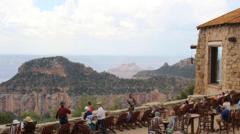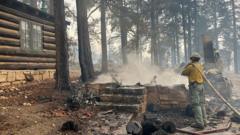Air quality alerts have been issued across Canada and northern parts of the United States as smoke from persistent wildfires severely affects urban areas.
Wildfire Smoke Causes Air Quality Alerts Across North America

Wildfire Smoke Causes Air Quality Alerts Across North America
Severe air pollution concerns prompt warnings for residents of Canada and the US to stay indoors.
Air quality alerts are currently affecting numerous regions across Canada and the northern United States due to smoke spewing from ongoing wildfires. Authorities are urging citizens to limit outdoor activities, as the air quality has plunged to alarming levels. Environment Canada has reported that Toronto's air quality is now among the worst in the world.
In response to the alarming situation, officials in the US have also issued air quality alerts, notably in Chicago, which are set to remain in effect through Tuesday evening. Special attention is being drawn to vulnerable groups, including infants, the elderly, and those with existing health issues. Prime Minister Mark Carney is scheduled to meet with emergency responders in Ottawa to evaluate the current crisis, as thousands have been displaced from their homes due to the expanding wildfires in Manitoba, Saskatchewan, and northern Ontario.
According to Environment Canada's alert, "When air pollution levels are high, everyone should limit time outdoors," indicative of the urgent need to protect public health. The National Weather Service in Chicago echoed similar sentiments about the hazardous air caused by unhealthy ozone levels exacerbated by the Canadian wildfires.
The situation has sparked political tension, with a group of US lawmakers reaching out to the Canadian ambassador, expressing their concern about the smoke disrupting summer activities in the US. In a counter-response, the Manitoba premier criticized the lawmakers for trivializing an incredibly serious situation.
Wildfires have been rampant in western Canada during May and June, leading to the evacuation of about 30,000 individuals across Saskatchewan and Manitoba, where states of emergency have been declared in various localities. Eastward, a new fire on the Bonavista peninsula in Newfoundland has doubled in size overnight, threatening numerous cabins and further intensifying the crisis. Scientists directly relate the increased severity of wildfire seasons to climate change, noting that Canada is warming at an alarming rate that is twice the global average, particularly in its Arctic regions.



















